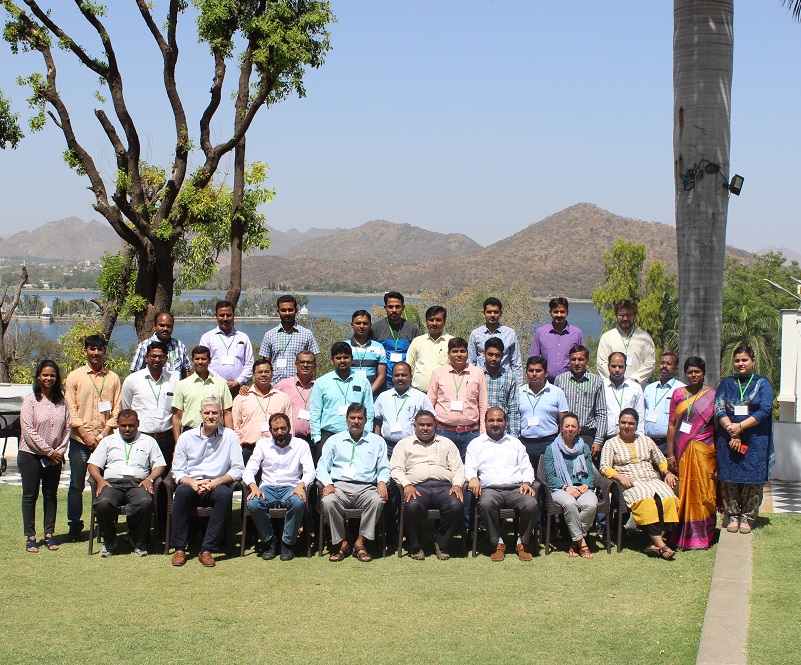The fourth international workshop on “Science of Farming Systems: Moving from Prototyping to Model-Based Assessment and Designing of Sustainable and Resilient Farming Systems in South Asia” took place in Udaipur, Rajasthan, India from 19 to 22 March this year. The workshop was jointly organized by the International Maize and Wheat Improvement Center (CIMMYT), Wageningen University & Research (WUR) and the Indian Council of Agricultural Research (ICAR) – Indian Institute of Farming System Research (IIFSR) and was supported by the CGIAR Research Program on Wheat Agri-Food Systems (WHEAT) and the CGIAR Research Program on Climate Change, Agriculture & Food Security (CCAFS).
Twenty-five participants from 11 research centers across 13 Indian states and Nepal attended the workshop. Workshop objectives included mainstreaming science-based approaches to farming systems analysis and research for development programs in South Asia, as well as overview and training courses on farming systems and technologies, especially focusing on FarmDESIGN, modelling software developed by WUR. A number of talks around FarmDESIGN were given, including hands-on workshops by scientists from CIMMYT and WUR.

South Asian farming systems are characterized by a large diversity of smallholder systems with diversified faming system households. Accordingly, the farming systems research has been central to the south Asian national agriculture research systems. ICAR-IIFSR has developed specific integrated farming systems (IFS) prototypes for different agro-ecological zones of India and implemented them in research stations and rural communities.
The growing complexity of climate, markets and income uncertainties, as well as large age divides within farming households limits the large-scale adoption these prototype farming systems weigh output performance on the one hand and tradeoffs such as income resilience, environmental footprints and markets on the flip-side. Therefore, designing farm systems with effective targeting of climate resilience, profitability and sustainability, requires suitable technologies, practices to understand and capture the diversity of farming systems, their main components, characteristics, interrelationships and flows.
Previous CIMMYT-ICAR-WUR collaborations have explored the use of farm level modeling tools to assess, with multiple criteria, the sustainability of such IFS, identify main trade-offs and synergies and provide guidelines for their improvement. Capacity development of farming system network researchers on the use and application of the FarmDESIGN model has been one important activity in such collaboration. For scaling the outputs of such exercise, the farming systems have to be evaluated in terms of relevant indicators for different farm household types and communities, allowing them to identify main potential leverages and obstacles for adoption of different intervention. In this regard, this workshop is being organized involving key stakeholders.
The workshop objectives were to mainstream science based approaches for farming systems analysis in research for development programs in South Asia; to share results of integrated assessments of farming systems’ performance in a range of agro-ecologies across South Asia and discuss main implications for the re-design of IFS; to select methods for improved prototyping and model-based analysis using on-station data for developing an out-scaling process that is tested in multiple environments for large scale application; to share and solve main technical barriers implementation; to share and discuss other modeling techniques and their potential complementarity; to provide an overview of the application ‘FarmDESIGN,’ which was created by WUR, discuss main issues for further development to cover the needs of South Asian farming systems and further steps for larger implementation; discuss future research activities and collaborations.
Santiago Lopez Rodaura, senior farming systems specialist, CIMMYT and Jeroen Groot, farming systems expert from WUR gave a hands-on session on debugging, analysis visualization and analyzing prototype implementations in FarmDESIGN. AK Prusty, scientist, ICAR-IIFSR and collaborators from WUR, elaborated on-farm diagnosis and analysis in FarmDESIGN. AS Panwar, director, ICAR-IIFSR, led a session with presentations of case studies from peer review articles in diverse ecologies to demonstrate improved efficiency, income and reducing footprints through optimizing resource allocation with science-based approach using FarmDESIGN and other modeling programs using at least 10 prototype farming systems cases.
The workshop concluding with a planning session facilitated by CIMMYT principal scientist ML Jat. Recommendations were made by all the participants and emphasized studies on ongoing interventions looking at 10-15 year scenarios in cropping systems. Participants suggested studying climate prediction data and crop simulations with alternate wet-dry techniques to consider variability in the water table, among a number of other follow-up suggestions.
A “Virtual Task Force” was assigned to organize follow-ups on progress made based on meeting suggestions across locations and present a document to the Prime Minister of India’s office with suggestions for the Government of India’s initiative “Doubling farmer Income by 2022.”
Participants suggested creating a users guide for FarmDESIGN to be circulated to encourage wide-scale adoption, along with a manual for targeting typology interventions.
Panwar said, “seeing the progress across sites, I am convinced with the impact FarmDESIGN model has brought and will continue to with support from CIMMYT and WUR for changing face of cropping systems research”.
The program was able to achieve its target for improved understanding and capacity of key researchers on designing and implementing science based farming systems for improved efficiency and enhanced adoption in smallholder systems of South Asia.
The fourth international workshop on “Science of Farming Systems: Moving from Prototyping to Model-Based Assessment and Designing of Sustainable and Resilient Farming Systems in South Asia” was jointly organized by the International Maize and Wheat Improvement Center (CIMMYT), Wageningen University & Research (WUR) and the Indian Council of Agricultural Research (ICAR) – Indian Institute of Farming System Research (IIFSR) and was supported by the CGIAR Research Program on Wheat Agri-Food Systems (WHEAT) and the CGIAR Research Program on Climate Change, Agriculture & Food Security (CCAFS).


